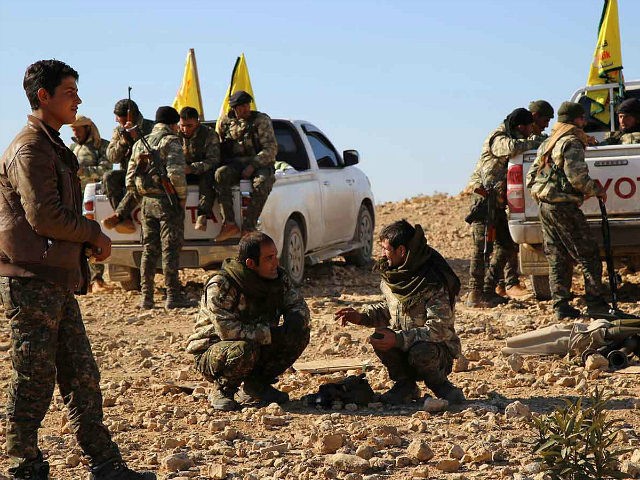American officials have assured the government of Turkey that, while the Syrian Democratic Forces (SDF) are largely Kurdish fighters, the Kurds will not take on the main role of liberating the Islamic State “capital” of Raqqa, Syria.
While Ankara cooperates often with the Iraqi Kurdish Peshmerga, it considers the Syrian Kurdish Peoples’ Protection Units (YPG/YPJ) “terrorist” entities akin to the Kurdistan Workers’ Party (PKK), a Marxist U.S.-designated terrorist group.
“We always knew the SDF wasn’t the solution for holding and governing Raqqa. What we are working on right now is to find the right mix of forces for the operation,” Chairman of the U.S. Joint Chiefs of Staff General Joseph Dunford said this week, asserting that Arab forces exist with the ability to enter the city and eradicate the Islamic State jihadist presence. “[The operation needs] a predominantly Arab and Sunni Arab force… And there are forces like that,” he asserted.
The SDF presence outside of Raqqa, Dunford argued, was necessary in order to ensure that a parallel operation in the Islamic State’s Iraqi capital, Mosul, was successful. “The SDF is making sure the IS forces that are in Mosul cannot reinforce the IS forces in Raqqa, and that the force in Raqqa cannot conduct external operations into Turkey, into Europe and into the United States,” he argued.
Dunford, in Ankara Monday, had asserted that Turkey will have a role in the liberation Raqqa. President Recep Tayyip Erdogan has insisted for weeks that Turkey has a rightful place in that military operation, as Raqqa is a southern Syrian Arab and Turkmen stronghold, not a part of Rojava, or Syrian Kurdistan.
Dunford has been careful to ensure that the public understands the mission will be an extended one. “We always advertised that the isolation phase is going to take months,” he said this week. The Telegraph, citing Dunford’s remark, added that an anonymous official told the newspaper the U.S. did not believe “an available force” existed to enter Raqqa city limits successfully.
On Monday, Foreign Minister Mevlüt Çavuşoğlu issued yet another plea to the United States to reconsider cooperation with the YPG/YPJ, who have historically been extremely pro-American aid.
“The U.S. says they don’t give arms to the YPG. But we know that they have done since Kobane,” he noted, referring to the border town the YPG liberated from the Islamic State last year. “…And we told Dunford not give weapons to them,” he insisted.
The Kurdish news outlet Rudaw notes, however, that the SDF is not an exclusively Kurdish coalition of militias, naming six different Arab fighter coalitions: the Raqqa Falcons Brigade, the Ahrar al-Raqqa Brigade, the Liberation Brigade, the Raqqa Martyrs Brigade and the Tal Abyad Revolutionaries.
The SDF published a list of the militias participating in their coalition in response to the criticism that an all-Kurdish force should not play a significant role in Raqqa. The YPG and YPJ are on that list, however.
In addition to the Kurds and Arabs, a Turkmen brigade and a female Christian group were also on the list.
“We men and women who protect the oldest Christian community on earth ask the global Christian community to stand up for us and give us political, practical and moral support,” a statement from two Christian coalitions read.
In Mosul, the Peshmerga and the Iraqi Shiite Popular Mobilization Forces (PMF) are responsible for circling the city limits and capturing any fleeing Islamic State jihadists, but Baghdad has forbidden them from participating in battle within the city limits. This strategy has so far been successful, if slow, though remaining beholden to the abilities of Iraqi government soldiers, which have a history of fleeing battle.
Such a situation is impossible in Syria, as the Syrian government forces are highly unlikely to cooperate with a coalition of Kurdish militias fighting for freedom from Damascus and forces seeking to overthrow dictator Bashar al-Assad. Instead of fighting the Islamic State in the south, Syria’s forces are concentrating on eradicating anti-Assad elements in northern cities like Aleppo and Homs.
The SDF has continued its march into Raqqa’s suburbs with relatives success. Rudaw reports that the forces advanced 12 kilometers (7 miles) into the Raqqa outskirts in two days, with help from U.S., French, and British airstrikes on Islamic State jihadists. The forces have encountered what, by now, are considered conventional Islamic State tactics: car bombs and hidden mines intended to hold back the assault.

COMMENTS
Please let us know if you're having issues with commenting.